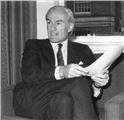Leyland 'not earning enough - jobs may be put in jeopardy'
28 November 1970
CLIFFORD WEBB
Mr. John Barber, British Leyland's director of finance and planning, is the latest of a growing list of the group's senior executives to warn employees of the need for a major effort to protect their jobs.
'At the moment we are just not earning enough to ensure that we will be competitive in the future, and that would mean contraction, fewer employees and, in the end death', he says in Austin Morris Express, an internal news-sheet. British Leyland must grow bigger because its competitors were expanding all the time and if it did not keep up with them it would be left behind.
Mr. Barber continued: 'We are planning on the basis that world markets for vehicles will be expanding continuously over the next 10 years. Our job is to maintain our position among the big boys. We are in the top 10 of the world's motor manufacturers. The line up judged on sales turnover is General Motors, Ford, Chrysler, Volkswagen and ourselves with Fiat, Renault and Toyota all close together jockeying for sixth place. But these three may leave us behind if we are not careful.'
Despite its £1,000m. a year turn- over British Leyland was half the size of Volkswagen and one tenth the size of General Motors. It had to increase its productivity. Mr. Barber said last year sales per employee were £5,000 compared with £8000 by its big Continental competitors. To achieve this greater productivity it needed money, 'a great deal of it'.
And the company was in a vicious circle at present with low profits due to stagnation of the home market and production losses through stoppages. Reminding workers that profits in the first half of the year were only £lm., Mr. Barber said the only other cash coming in was £40m. a year from depredation charges on existing plant. But British Leyland was investing at the rate of £50m. to £60m. a year in new plant and tooling.
'So the money coming in does not cover the capital expenditure and the corporation is having to borrow more, particularly from the banks.'
In his view the level of investment was not enough. Continental motor firms were investing between £80m. and £100m. a year. To improve the situation costs designed into new vehicles were being kept to a minimum. Once production had started they had also to make sure a car was produced at the lowest cost.
Mr Barber continued: 'We have in the pipeline a new Morris car coming out next year and there will be others in the Austin-Morris side of the organization. These are the ones where the cost saving techniques have been applied and they will be good cars.'
British Leyland would probably have a smaller number of larger more modem plants but not necessarily with fewer employees because the overall plan was expansion.
More news from the archive
Compare classic car insurance quotes and buy online. A friendly service offering access to a range of policies and benefits.





